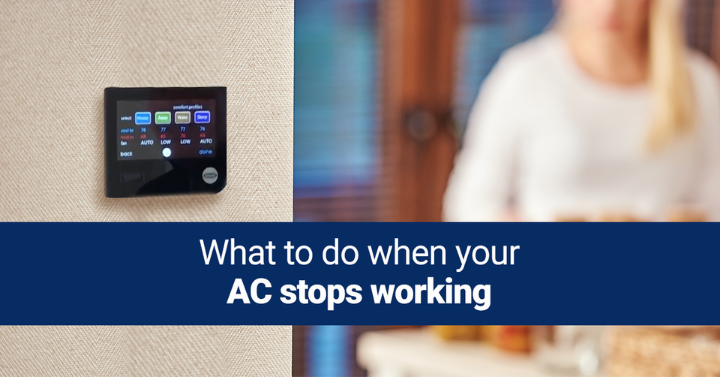
If the temperature’s rising in your home, you have to act quickly to stay cool. Most people are comfortable at 74F. Any hotter than that, and you’ll start feeling the effects in your comfort, sleep, and productivity. So if your AC stops working, what do you do?
First, don’t panic! A cooling system that isn’t functioning doesn’t necessarily mean an expensive repair or that it’s time to replace. In fact, many HVAC systems have built-in safeguards to prevent internal damage to the system. In many cases, an air conditioner that isn’t working is a temporary condition that is fixable in a matter of hours. Follow these steps to get comfortable, faster!
1. Check Your Thermostat
Okay, this might be too obvious. But your thermostat will often have helpful information that can help in troubleshooting. First, make sure your thermostat is set to on, in cooling mode, and that the setpoint is lower than the room temperature. Next, check to make sure there isn’t any hold set up or an automatic program that could be causing your AC to turn off. Then, look to see if your thermostat is showing any errors. Smart thermostats often have alerts or notifications that may give you a clue to what’s going on.
2. Perform a Visual Inspection
There are a few simple things you can look for that might be the source of your broken air conditioning system. Don’t worry – this is suitable for beginners!
- Is your air filter dirty? Sometimes, a clogged filter can cause the AC to stop working. Replace your air filter to get things moving again.
- Is the primary drain pan full of water? Almost all air conditioners are equipped with something called a float switch. A float switch is a sensor that will turn off your AC if the water in the pan gets too high. To get your AC working again, you can simply empty the drain pan. But beware; if your drain pan is getting full too quickly, it could be an indicator of a more significant problem.
- Is your secondary drain dripping (or gushing) water? Most air conditioning units will have a secondary drain pipe that is positioned to drip in front of a window. If there is water coming out of this tube, then it means your primary drain is blocked. It’s time to call in an expert to help unclog your drain.
3. Identify the Loss of Operation
Another step to take if your AC stops working is to figure out what exactly is not functioning correctly. This can help narrow down the problems for diagnosis. Some usual suspects that may not be working include:
- The thermostat has no power
- The indoor blower fan does not turn on
- The outdoor unit fan in the condenser unit does not turn on
- Outdoor condenser does not turn on
If any of these appear to be the problem, you can try resetting the circuit breakers. First, turn off the AC and any other lights or devices that may be connected to nearby circuits. Then, head to your circuit breaker panel and turn off the switch for the air conditioning system, wait five seconds, then turn it back on. Only do this once for safety purposes!
4. Call a Certified Technician
If nothing you have tried has worked, it is time to call a knowledgeable technician. The experts at DTC work on broken ACs day in and day out. We provide same-day service so you can get back to feeling comfortable today.
When you call to request service, it can be helpful to share a list of the things you’ve already tried, or what you have noticed while diagnosing. If you know the make and model number of your AC system components, that can be helpful to share as well. When technicians have this information, they can be more prepared with proper parts and tools on-hand to solve the problem quickly and efficiently in one visit.
If your AC Stops Working, Call DTC
Our expert team at DTC can fix your air conditioner today. Serving Georgetown, Cedar Park, Round Rock, TX and surrounding areas, we’re your local HVAC professionals. You can trust that you’ll be getting high-quality services and affordable prices. Contact us now!
